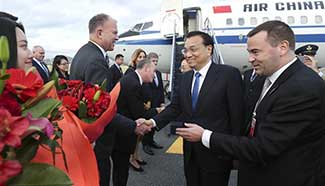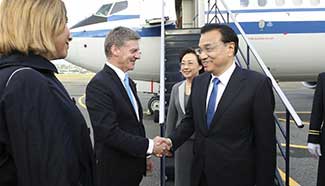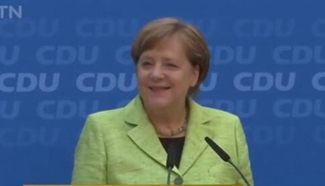BEIJING, March 28 (Xinhua) -- Jenny Shipley, board member of the Boao Forum for Asia and former New Zealand prime minister, should feel encouraged that her country became the first Western developed economy to sign a cooperation agreement with China on the Belt and Road Initiative on Monday.
Two days earlier, at the Boao Forum for Asia in China, Shipley said consensus and concrete action were needed to support globalization.
Globally, there is much talk about how economic globalization can help the world economy. In this regard, China has already rolled out a string of measures.
A statement on economic globalization released by the BFA called on Asian countries to stay committed to open markets, inclusive growth and economic cooperation.
The Belt and Road Initiative, proposed in 2013 to build a trade and infrastructure network connecting Asia with Europe and Africa, is part of measures initiated by China to support globalization.
It is the single most important globalization initiative at the current time, which supports cross-border integration in terms of infrastructure, cross-border investment and international trade. The project as a whole will support growth, development and the prosperity of participating countries, according to Jose Vinals, chairman of Standard Chartered Plc.
Domestically, China has been making it easier for foreign investment to enter China. Shanghai Free Trade Zone (FTZ) is one example of efforts in this regard.
Since its establishment in 2013, the FTZ negative list, which defines areas off-limits or restricted for foreign investment, has been cut from 190 items to 122 items. Moreover, registration for foreign firms has been significantly streamlined.
A top leadership meeting last week approved a plan to deepen reform and opening up of Shanghai FTZ through trade, investment, liberalization and institutional changes that can be replicated throughout the country.
China has four FTZs and detailed plans on seven more are expected to be released soon.
In addition, Chinese enterprises are making big strides into cross-border trade and investment.
Alibaba Group last week announced it would establish an e-commerce hub in Malaysia covering logistics, cloud-computing and e-financial services that will boost trade and e-commerce in the region.
The e-commerce hub will be part of a collaboration between Alibaba and the Malaysian government on a Digital Free Trade Zone (DFTZ) in Malaysia, and in line with the Electronic World Trade Platform (eWTP) promoted by Alibaba Executive Chairman Jack Ma.
"We should make globalization more inclusive," he said, calling for more participation by developing countries, small businesses and young people.
China's non-financial outbound direct investment in 2016 soared 44.1 percent year on year to 170 billion U.S. dollars, according to official data.
"The year 2016 was marked by a series of black swan events signalling a drastic change in the current course of globalization. However, we see it as not so much the end, but a new chapter," said Xu Sitao, chief economist at Deloitte China.
China is expected to attract 600 billion dollars of foreign investment in the next five years, with outbound investment reaching 750 billion dollars.
"In this new turn of globalization, we believe that China will undergo a transformation from passive participation in the global division of labor to actively reshaping the global value chain," Xu added.














